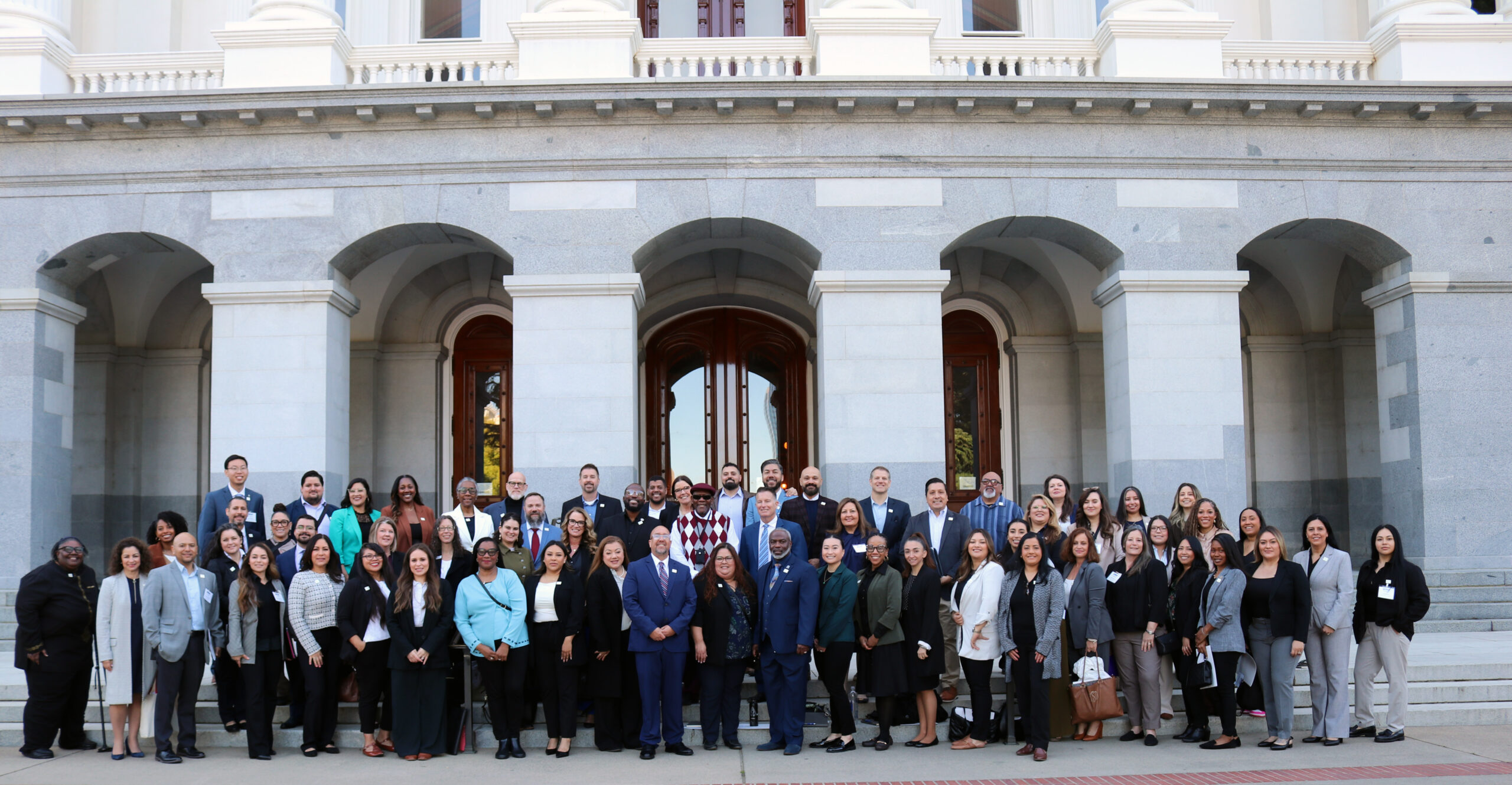On a sunny spring day in April, nearly 80 nonprofit leaders from the Inland Empire gathered on the steps of the California State Capitol as they prepared for a busy day of dialogue around improving the health and wellness of families with children throughout San Bernardino and Riverside counties.
The Champions for Vibrant Health Leadership Network, sponsored by IEHP Foundation, is a cadre of 80 Inland Empire leaders representing 40 nonprofit organizations dedicated to building healthy neighborhoods and cultivating healthy living – ensuring all residents, especially families with children, have access to “Vibrant Health” across the region. This two-year leadership development program for Inland Empire community-based organizations (CBOs) aims to increase organizational capacity, collective advocacy and operational funding to improve physical and mental health across the Inland Empire.
The trip proved to be a valuable experience as these nonprofit leaders engaged in 75 meetings with legislative offices to educate legislators about issues they identified as being vital to residents of the Inland Empire, including affordable housing, mental health and economic mobility.
Among the issues discussed was the potential impact of cuts to Medi-Cal, California’s health insurance program for low-income families, which is critical since approximately 43% of Inland Empire residents rely on it. Nonprofit leaders shared stories from their organizations to highlight the positive impact and outcomes of state and federal programs like Medi-Cal have on the children and families they serve and how severe cuts would have dire economic and health consequences for the region.
Surprisingly, about 75% of these nonprofit leaders had not previously engaged in public policy and advocacy, and for many, this was their first visit to the State Capitol. One of those leaders was Jamie Lamb, a veteran nonprofit professional in the Inland Empire, who currently serves as Chief Executive Officer of Cedar House Life Change Center, a recovery and rehabilitation center based in Bloomington.
“For someone like me who had never engaged in advocacy before, this trip truly opened my eyes to where and how decisions are made that affect our communities,” said Lamb. “I have a greater understanding and desire to get further engaged in advocacy.”
In addition to meeting with legislators and their offices, the Leadership Network heard from California State Treasurer Fiona Ma and California’s Chief Service Officer Josh Fryday. Both emphasized nonprofits’ critical role in collaboratively enhancing health and wellness across the Inland Empire, praising the region’s resilience and strength.
This Leadership Network and its advocacy trip are part of a broader movement among nonprofit collectives in the region to improve collaboration among community-based organizations and leverage greater philanthropic support for San Bernardino and Riverside counties.
According to a report from the Inland Empire Funders Alliance, the region receives significantly less philanthropic funding compared to its coastal neighbors, with about $25.55 allocated per capita. In contrast, Los Angeles County sees $245.05, while the state average stands at $262.99.
The urgent need for resources to improve the well-being of Inland Empire residents is undeniable. Both San Bernardino and Riverside counties rank below the 50th percentile in the Healthy Places Index (HPI), which measures health outcomes throughout California. Specifically, San Bernardino County’s ranking falls within the 25th percentile, while Riverside County is slightly higher at 41.1 percent. Compounding these challenges are systemic issues, including cost-of-living, housing affordability, food insecurity, and limited high-wage jobs.
Nonprofits are also facing a new set of headwinds as the federal administration is rolling out program reductions and executive orders that impact a wide array of community based organizations, including the decrease or removal of grant funding, limitations on program activities, and increased fear among those they serve – all of which make nonprofits’ daily work that much more challenging.
The Inland Empire Community Collaborative (IECC) is a pivotal player in building the capacity and public policy strength of nonprofits in the region. Focused on enhancing the lives of children and families, IECC forges partnerships across a vast network of nonprofit organizations, positioning itself to promote justice and equity for underserved communities. IECC collaborates with local nonprofits to build their advocacy skills while ensuring compliance with regulations that govern their nonprofit status. Susan Gomez Chief Executive Officer of IECC states the organizations advocates not just for nonprofits, but with them.
“The nonprofit sector in the Inland Empire reflects the aspirations, needs and resilience of our communities,” said Gomez. “IECC brings organizations together to amplify a collective voice that policymakers can’t ignore.”
Clearly, nonprofit leaders, deeply entrenched in their communities, possess unique insights into the challenges faced by their constituents and are well-positioned to educate and inform elected representatives on how legislation and policies can positively or negatively impact the communities they serve.
So, if you happen to be on a flight to Sacramento, don’t be surprised if you notice a few friendly nonprofit leaders on their way to educate and advocate for the improvement of health and wellness across the Inland Empire.
